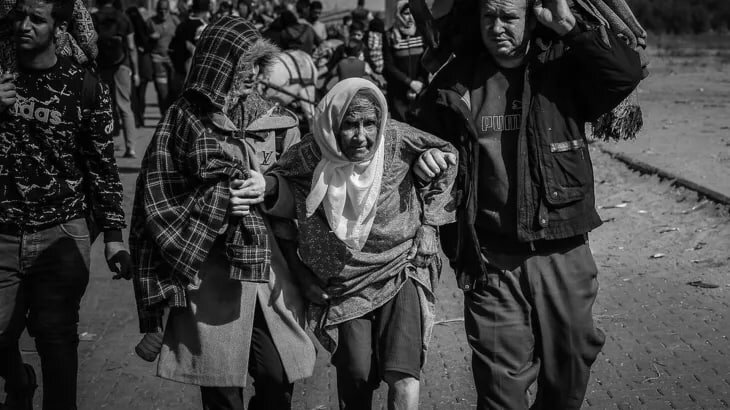Tehran – On May 15th, 2025, Nakba celebrates its 77th anniversary. This was a catastrophe in 1948 that forced uprooted more than 750,000 Palestinians and wiped out more than 500 villages. However, this tragedy is not limited to the past. In Gaza in particular, it continues to echo at the present day.
Gaza is now a living example of ongoing ethnic cleansing and colonial expansion, thanks to siege, extensive displacement and merciless violence that reflects the trauma of the original Nakba.
As international warnings about the “Second Nakba” intensifies, the world must face a calm moral reality. Nakba is an open wound that continues to bleed daily for the silence and cooperation of the powers of the world.
Displacement and loss catastrophe
Naqba began in 1948 with the establishment of the Israeli regime through a systematic campaign to cleanse ethnicity against the Palestinians. Later supported by Israeli forces, Zionist militia forced the Palestinians out of their homes through massacres, village destruction and psychological horror.
Palestinian homes were destroyed or relocated by Jewish settlers, and biological tactics such as poisoning wells were employed to prevent Palestinians from returning.
In addition to being a historical event, Nakba is seen by the Palestinians as a critical trauma that shaped the national identity and sense of political ambition.
It led to family separation, loss of homeland and a generational refugee crisis. Palestinian testimony and independent historians have long fought over Israeli stories that minimize or deny these events, portraying them as important elements of the nation.
Today’s Gaza: The Tragedy of Nakuba’s Development
Nakba’s legacy is painfully alive in Gaza. There, 2.3 million Palestinians endure one of the bloodiest tragedy and most serious humanitarian crises in the world today. Since October 2023, Gaza has faced ethnic cleansing.
Israel has also prevented the provision of humanitarian assistance, including food, water, medicine and fuel, to the enclaves that have been sieged since March 2, 2025.
The lockdown caused catastrophic hunger, malnutrition and medical services collapse. According to the World Health Organization, nearly half a million people in Gaza face acute malnutrition, and children die every day from hunger and preventable diseases.
Recent Israeli military operations have evicted more than 450,000 Palestinians within Gaza, reflecting the forced expulsion of the original Nakba.
The United Nations warns that the world is witnessing “another Nakba” as Israel pursues “colonial expansion” through ethnic cleansing and land confiscation. The destruction of civil infrastructure, including UN shelters, and the targeting of health and aid workers, exacerbate the suffering and violate international law.
Voice from Nakba: Memories of Loss and Enduring Hope
Testimony from Nakba survivors combines the trauma of 1948 with the current fears of Gaza, providing a deep, human and moving window into the ongoing catastrophe that transcends time.
Hakma Atallah, now 105 years old, vividly remembers the day her village was attacked, forcing her family to escape with only clothes and keys on her back. Despite the enormous losses, Hakma’s story, shared with Unrwa, embodies a resilient hope for justice and the right to return, a hope that supports Palestinians across generations.
Similarly, Abdul Rahman Yasin, who was eight years old during Naqba, speaks of the beauty of his childhood in the village of Al Jora before the refuge shattered his world. He lived through every chapter of Palestinian suffering, from Nakba to the 1967 occupation, to multiple wars in Intifada and Gaza.
His family has endured the massacre, the loss of his son and the destruction of his home. However, his testimony is not only one of pain, but one of the constant durability, highlighting that Nakba’s trauma is not limited to history, but is continually given to Palestinians today.
The memories of Fatima Khamemes Alyaan Abu-Shammala lead to sharp relief to Nakba’s human costs. At the age of 14, she escaped from the green village of Beitdoras and walked 20 days to the Khan Yunis refugee camp, where she lived in a tent with her family for three years.
She recalls feelings that have been painfully revived by the sounds of gunfire, hunger and the loss of a loved one, and the ongoing artillery fire in Gaza. Her story is an unforgettable memory for Palestinians that Nakba is not a distant memory, but a repetitive nightmare.
These stories reveal the cyclical nature of Palestinian suffering, the relentless repetition of confiscation, violence and exile. But they also emphasize their indomitable resolve to resist elimination. Survivors like Ramadan Emad, who fought against the Arab forces in 1948, now protect only Gaza, but believe they have hope for liberation and return.
Their memories are living testimonies that bridge the past and present, demanding that they fulfill their rights of recognition, justice and Palestinian return.
The psychological scars that these survivors were born are profound, but their voices refuse to be silent. They expose ongoing ethnic cleansing and colonial policies that continue to traumatize Palestinians.
Throughout their stories, Nakba appears not as a closed chapter, but as a continuous wound. The world must acknowledge whether there is hope for peace and justice.
The open wounds of Palestine
Just as the world celebrates Nakba’s 77th anniversary, the open wounds of Palestine are still incredibly raw and unhealed.
Nakba is not a remote historical event, but a reality that continues to influence Palestinian identity, life and struggle.
The 1948 confiscation is directly reflected in the current tragedy of Gaza, characterized by constant artillery fire, forced relocation of over two million people, and a crippling siege that denies necessity.
The truth about Nakba is preserved by the memories of survivors who relive past and present trauma and seek rights to justice and return. However, the inaction and silence of the global community in the face of these crimes constitutes a serious ethical disruption.
As Gaza serves as a living example, the current question is whether the international community will stop silence and respect international law, or whether Nakba will continue daily.

